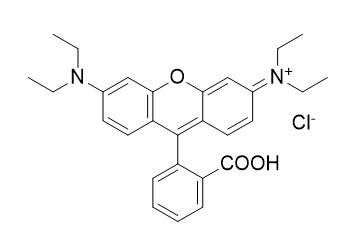Rhodamine B
Rhodamine B is used as a tracer dye in water to determine the rate and direction of flow and transport. It is a staining fluorescent dye used in fluorescence microscopy, flow cytometry, fluorescence correlation spectroscopy and ELISA in biotechnology fields.
Inquire / Order:
manager@chemfaces.com
Technical Inquiries:
service@chemfaces.com
Tel:
+86-27-84237783
Fax:
+86-27-84254680
Address:
1 Building, No. 83, CheCheng Rd., Wuhan Economic and Technological Development Zone, Wuhan, Hubei 430056, PRC
Providing storage is as stated on the product vial and the vial is kept tightly sealed, the product can be stored for up to
24 months(2-8C).
Wherever possible, you should prepare and use solutions on the same day. However, if you need to make up stock solutions in advance, we recommend that you store the solution as aliquots in tightly sealed vials at -20C. Generally, these will be useable for up to two weeks. Before use, and prior to opening the vial we recommend that you allow your product to equilibrate to room temperature for at least 1 hour.
Need more advice on solubility, usage and handling? Please email to: service@chemfaces.com
The packaging of the product may have turned upside down during transportation, resulting in the natural compounds adhering to the neck or cap of the vial. take the vial out of its packaging and gently shake to let the compounds fall to the bottom of the vial. for liquid products, centrifuge at 200-500 RPM to gather the liquid at the bottom of the vial. try to avoid loss or contamination during handling.
Indian J Pharm Sci.2022, 84(4): 874-882.
J Ethnopharmacol.2019, 235:406-414
Molecules.2018, 23(12):E3103
VNU J of Science: Med.&Pharm. Sci.2023, 39(1):20-29.
American Association for Anatomy2020, doi: 10.1002.
Pharmacia2024, 71:1-9.
Food Chem.2020, 327:126992.
PLoS One.2018, 13(11):e0208055
Naunyn Schmiedebergs Arch Pharmacol.2021, 394(1):107-115.
Org Biomol Chem.2017, 15(31):6483-6492
Related and Featured Products
Photochem Photobiol Sci. 2017 Oct 30.
Fluorescence lifetime of Rhodamine B in aqueous solutions of polysaccharides and proteins as a function of viscosity and temperature.[Pubmed:
29083002 ]
Rhodamine B (RhB) is a well known dye extensively used in thermometric studies, either considering the decrease in the fluorescence intensity or the lifetime (τ) with temperature. Lifetime measurements are preferred over intensity ones as they are more robust.
METHODS AND RESULTS:
In order to expand microscopy thermometry to complex food fluids, the effect of solutes on the τ of RhB was studied using fluorescence lifetime imaging microscopy (FLIM) in a two-photon microscope. Polysaccharides of different molecular weights (glucose, lactose, dextran, maltodextrin, and sodium alginate), as well as whey proteins, were considered as typical model food ingredients. A linear increase in τ with the concentration is observed in most polysaccharides, highlighting that it is not due to an increase in the macroscopic viscosity, but in maltodextrins a Langmuir-like concentration dependence is observed. There are extensive interactions between RhB and whey proteins at small concentrations that quickly increase τ up to saturation at >10 wt% proteins, with τ modelled well using an adsorption Langmuir model.
CONCLUSIONS:
Therefore, the effect of solutes on RhB τ is not related to changes in the macroscopic viscosity. The temperature sensitivity of τ, quantified using apparent activation energies, decreases at high solute contents.
ACS Appl Mater Interfaces. 2017 Oct 25;9(42):36561-36572.
Nanoprobe Synthesized by Magnetotactic Bacteria, Detecting Fluorescence Variations under Dissociation of Rhodamine B from Magnetosomes following Temperature, pH Changes, or the Application of Radiation.[Pubmed:
29035036 ]
METHODS AND RESULTS:
We report a method of fabrication of fluorescent magnetosomes, designated as MCR400, in which 400 μM of Rhodamine B are introduced in the growth medium of AMB-1 magnetotactic bacteria and fluorescent magnetosomes are then extracted from these bacteria.
These fluorescent magnetosomes behave differently from most fluorescent nanoprobes, which often lead to fluorescence losses over time due to photobleaching. Indeed, when MCR400 are heated to 30-90 °C, brought to an acidic pH, or exposed to radiations, we observed that their fluorescence intensity increased. We attributed this behavior to the dissociation of Rhodamine B from the magnetosomes. Interestingly, enhanced fluorescence was also observed in vitro when MCR400 were mixed with either primary macrophages or tumor cells (TC1-GFP or RG2-Cells) or in vivo when MCR400 were introduced in rat glioblastoma.
CONCLUSIONS:
We showed that MCR400 internalize in tumor and immune cells (macrophages) leading to enhanced fluorescence, suggesting that fluorescent magnetosomes could be used during cancer treatments such as magnetic hyperthermia to image cells of interest such as immune or tumor cells.



